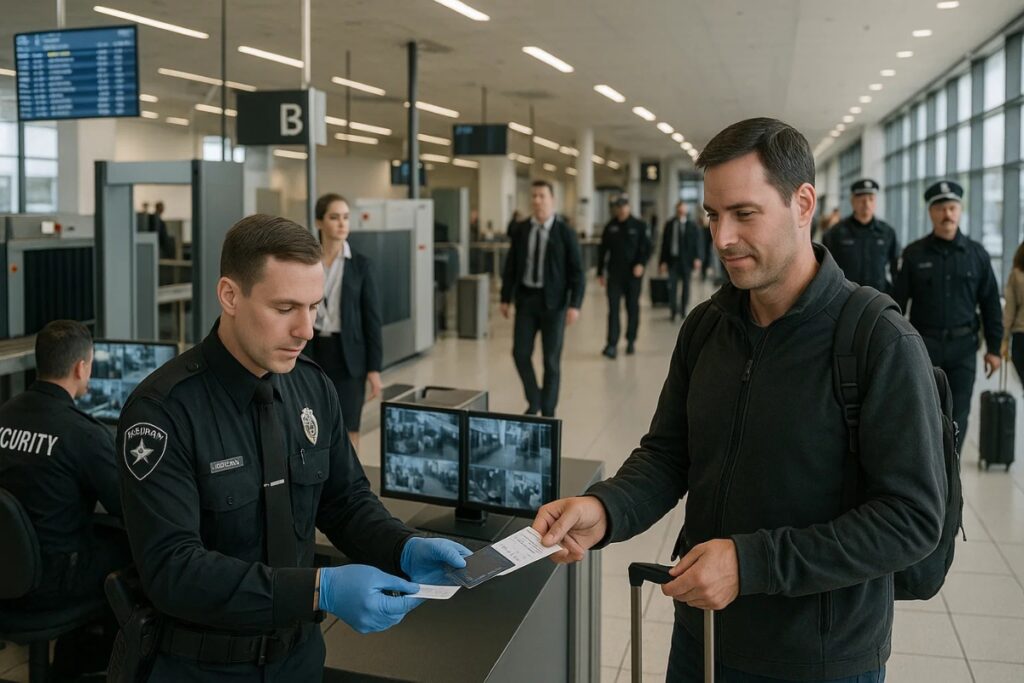Why Airport Security Matters
Airports are hubs of international connectivity, welcoming millions of travelers each year. With such large crowds and valuable infrastructure, security becomes a top priority. The presence of trained security guards not only deters criminal activity but also provides reassurance to passengers and staff. Their responsibilities go beyond surveillance; they are the frontline defenders ensuring that all operations run smoothly and securely. By combining vigilance, communication skills, and technical knowledge, airport security guards create a safe travel experience for everyone.
The First Line of Defense
Security guards are often the first individuals travelers encounter at airports. Positioned at entrances, parking lots, and checkpoints, they play a vital role in monitoring and identifying suspicious behavior. Their visibility alone deters potential threats, reinforcing the idea that airports are well-protected environments. This proactive presence reduces risks before they escalate into real dangers.
Passenger Safety and Assistance
One of the most important aspects of a security guard’s role is protecting passengers. This includes guiding them during emergencies, helping with lost items, and ensuring that no prohibited materials enter restricted areas. Many airports rely on guards trained in concierge-style security services to enhance both safety and passenger experience. These professionals combine safety protocols with customer service, creating a balance between security and hospitality.
Monitoring Restricted Zones
Airports contain sensitive areas such as control towers, baggage handling sections, and runways. Unauthorized access to these zones can compromise the entire airport system. Security guards stationed in these areas ensure only authorized personnel enter, reducing the chance of breaches. Their responsibilities include checking identification, scanning access cards, and conducting patrols to prevent suspicious activity.
Surveillance and Technology Integration
Modern airport security heavily relies on advanced surveillance systems. However, technology alone cannot replace human judgment. Guards monitor live footage, interpret unusual movements, and respond swiftly. They also collaborate with aviation authorities to assess risks in real time. By combining CCTV monitoring with on-ground patrolling, they create a comprehensive security system that leaves no blind spots.
Emergency Response and Crisis Management
Airports must be prepared for emergencies, from medical incidents to potential terror threats. Security guards are trained to act quickly under pressure. Their duties include crowd control, first aid, evacuation assistance, and communication with emergency services. Their ability to stay calm and decisive can save lives and prevent chaos.
Collaboration with Law Enforcement
Airport security guards do not operate in isolation. They coordinate closely with local police, aviation authorities, and customs officers. This teamwork strengthens airport security protocols and ensures consistent enforcement of regulations. Guards often provide intelligence that supports larger investigations, making them a valuable part of the national security network.
Screening and Baggage Checks
Ensuring prohibited items do not enter flights is a crucial role of airport security. Guards assist in baggage checks, use scanning equipment, and sometimes perform manual inspections. Their attention to detail prevents weapons, explosives, or other dangerous items from reaching aircraft, protecting both passengers and crew.
Crowd Management During Peak Hours
During peak travel seasons, airports can become extremely crowded. Security guards maintain order in queues, boarding areas, and terminals. By guiding passengers, controlling movement, and resolving disputes, they reduce stress and prevent accidents. Effective crowd management ensures travelers enjoy a smooth and safe airport experience.
The Human Element in Security
Technology is powerful, but the human touch remains irreplaceable. Guards notice subtle body language cues and unusual behaviors that machines may overlook. Their interpersonal skills also allow them to de-escalate tense situations peacefully. For many travelers, a security guard’s approachable yet firm presence provides reassurance in an otherwise stressful environment.
Training and Professionalism
Airport guards undergo extensive training in surveillance, crisis management, communication, and law enforcement procedures. Their professionalism ensures they can adapt to a wide range of scenarios, from handling suspicious packages to guiding passengers with special needs. Organizations like Security Guard Services emphasize high standards in training and deployment to meet the complex needs of airports.
Supporting International Travel Regulations
International airports follow strict safety regulations. Guards ensure compliance with global aviation standards, including restrictions on liquids, electronic devices, and customs protocols. Their enforcement helps airports maintain international credibility and passenger trust. Without their oversight, airports would struggle to uphold these essential rules.
Enhancing Traveler Confidence
Airports aim to make travel as smooth and safe as possible. When travelers see guards actively patrolling and assisting, they feel reassured that their safety is a top priority. This sense of security encourages more people to fly, supporting the travel industry. Guards thus indirectly contribute to economic growth by enabling safe global mobility.
Real-World Importance of Security Guards in Airports
Recent case studies highlight how quick action from guards has prevented serious incidents. From identifying unattended bags to stopping unauthorized entries, their vigilance plays a direct role in avoiding potential disasters. Articles such as this detailed overview show how guards contribute to airport operations beyond just safety.
The Future of Airport Security
As airports adopt AI, biometric scanning, and advanced screening systems, the role of guards will continue to evolve. Far from being replaced, they will work alongside technology, interpreting data and applying human judgment where machines fall short. The future will see an even stronger partnership between people and technology to create safer airports.
Conclusion
Security guards are the backbone of airport safety. Their responsibilities cover everything from surveillance and baggage checks to emergency response and passenger assistance. By combining technology, training, and professionalism, they ensure that airports remain secure yet welcoming environments. Without their presence, the efficiency and safety of international air travel would be at risk.
Frequently Asked Questions (FAQs)
1. Why are security guards essential in airports?
They provide frontline defense against threats, manage emergencies, and ensure passenger safety.
2. Do guards only monitor passengers?
No, they also protect restricted zones, coordinate with authorities, and oversee baggage checks.
3. How do security guards handle emergencies?
They assist in evacuation, crowd control, first aid, and liaise with emergency services.
4. What training do airport guards receive?
They undergo specialized training in crisis management, surveillance, and communication.
5. Can technology replace airport guards?
Technology enhances security, but human judgment remains irreplaceable.
6. How do guards improve the passenger experience?
They provide guidance, manage queues, and ensure smooth travel operations.



